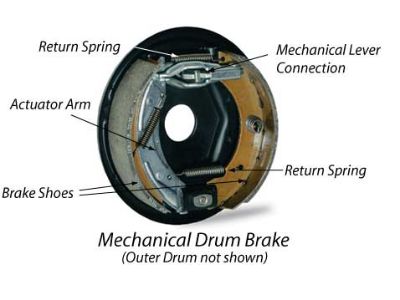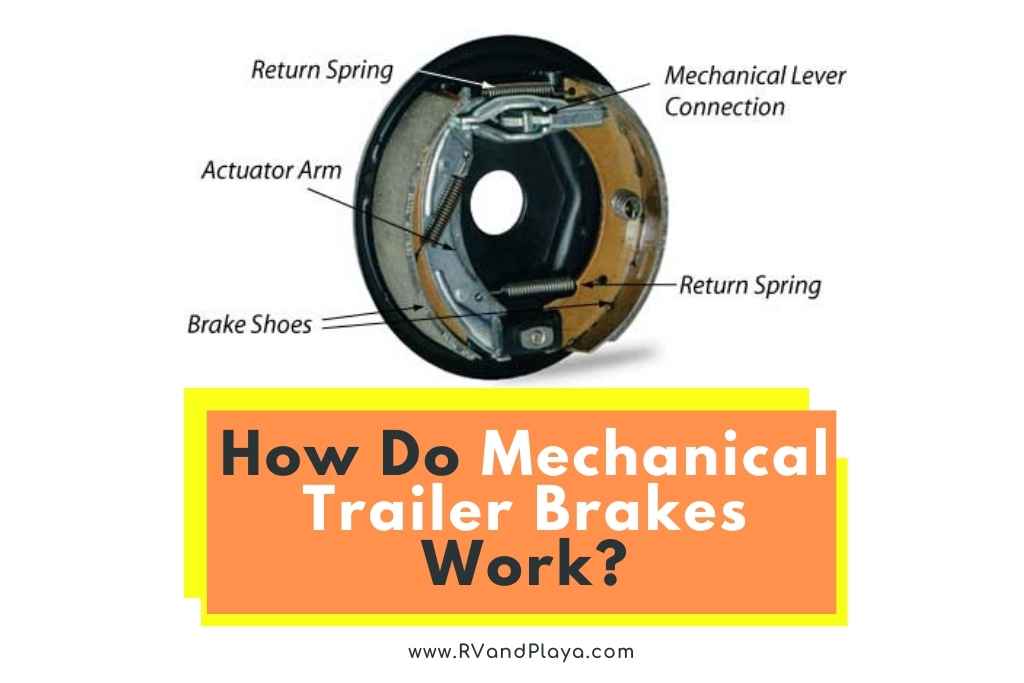Do you know how mechanical trailer brakes work? Trailer brakes: electric or override, disk or drum? Well, you are at the perfect place to find the answer to such a question.
When you own a lightweight trailer, perhaps the best braking system is a mechanical braking system. In fact, most lightweight trailers will either be set up with a mechanical braking system in place, or the ability to have one installed.
But, how do mechanical trailer brakes work? Well, luckily for you, we are going to tell you absolutely everything that you need to know on this page!
Table of Contents
How Do Mechanical Trailer Brakes Work?
Hopefully, you are already familiar with how brakes normally work in your vehicle. You press the brake pedal, and this causes a brake pad to push up against the wheels of your vehicle, slowing it down. Obviously, things are a little bit more complicated than that, but this is the gist.
Unlike brakes in your vehicle, mechanical brakes do not have a brake pedal that you can push. Instead, the braking process happens automatically when your vehicle slows down.
Unlike with electrical brakes, there is no need to have anything extra installed in your vehicle. There is no need to even have electrics on your trailer. Just hook the trailer with mechanical brakes up to your vehicle, and you are ready to go.
Read also >> Trailer Brake Controllers: 25 Facts You Should Know (Explained)
Let’s tell you how they work.
As you are traveling with a trailer attached to your vehicle, the trailer (should) be traveling at exactly the same speed as your vehicle. When you slow down in your vehicle, the trailer should slow down too. However, it takes a little while to react, particularly if it is on the heavier side. This is where mechanical brakes come into play.
With a trailer with mechanical brakes, there will be a small spring mechanism attached to the drawbar (coupling) between the tow vehicle and the trailer.
If the trailer is traveling faster than the tow vehicle, this spring mechanism is engaged.
When the spring mechanism is engaged, the brake cables are pulled. These brake cables will, in turn, activate the brake drums. The brake drums will then push against the trailer’s wheels, slowing the trailer down.
Read also >> How Much Can You Tow Without Trailer Brakes? (Explained)
When the trailer his the same speed as the vehicle, the brakes will be disengaged.
It is a simple system, but it is incredibly effective.
How Trailer Brakes Work & How To Inspect >> Check out the video below:
Are Mechanical Trailer Brakes Safe?
Yes. However, it is important that you do not exceed the maximum weight for your trailer and, of course, ensure that your brakes are properly maintained.
Mechanical trailer brakes are probably the most common type of brake out there. Just about every lightweight trailer will use them, to some extent.
There is very little that can go wrong with them. They do an absolutely fantastic job of slowing down the trailer when it appears to be traveling faster than your vehicle.
Obviously, you will need to learn how to keep that trailer straight while you are driving. The brakes tend to work a lot better like this. If the trailer is at an angle, then it may be traveling ever so slightly slower than the vehicle, which means that it may take a small amount of extra time to kick in.

Although, this isn’t really going to be a huge deal. If you are not keeping your trailer straight, then chances are that you have a lot more problems than whether the brakes are going to get you to stop anyway.
Are Mechanical Trailer Brakes Reliable?
Yes. This is assuming that you do not go over the maximum weight for your trailer. We are also assuming that you are regularly checking your brakes to ensure that there are no faults in any of the rather simplistic braking system.
Surprisingly, mechanical trailer brakes are often seen as much more reliable than their electrical equivalent. This is because there is no power that can cut out. There are no wires that can get shredded by whatever is on the road.
We can assure you that mechanical trailer brakes are going to serve you well. They are a tremendous piece of engineering, and there isn’t really a whole lot that can go wrong with them.
Although, once again, we do want to stress that mechanical trailer brakes are only going to be useful if you are driving a lighter-weight trailer.
Read also >> Should Electric Trailer Brakes Lock Up? (Explained)
Can You Reverse With Mechanical Trailer Brakes?
Yes. You should have absolutely no issues when it comes to reversing with mechanical trailer brakes. Well, you shouldn’t in most countries.
For some reason, Australia uses a slightly different standard for mechanical trailer brakes. Their standard does not explicitly require you to be able to reverse with the trailer while the mechanical trailer brakes are engaged.
However, this shouldn’t matter too much. Most mechanical brakes in Australia are going to be suitable for reversing anyway, you just may want to take a little bit of extra care when making a purchase if you live there.
Remember, mechanical trailer brakes should only engage if the trailer is moving faster than the vehicle.
This isn’t the case when you are reversing, but you may want to learn how to keep the trailer straight to ensure the coupling spring doesn’t engage.
Final Word
Mechanical trailer brakes are the simplest braking system for your trailer but are highly effective when you are pulling something fairly lightweight.
All these trailer brakes are will be a spring, a brake cable, and a brake drum. There isn’t really a whole lot that can go wrong with them, which often makes them superior to other options, including electric trailer brakes.
References
https://www.carbonequipment.com.au/blog/trailer-brakes-electric-or-override-disk-or-drumhttps://www.a2btrailers.com.au/electric-vs-mechanical-trailer-brakes/
Recent Posts
Have you ever wondered how to set a trailer brake gain? Look no more. We´ve got you covered. If you own a trailer brake controller, then you will need to become very familiar with the term...
Have you ever wondered should your electric trailer brakes lock up? Look no more. We´ve got you covered. If you have electric brakes on your vehicle, then you may find that they lock up on...

